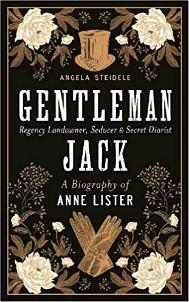
Earlier this year, HBO and the BBC treated us to Suranne Jones swaggering across the screen in butch Victorian get-up, playing the character of Anne Lister. The first season of Gentleman Jack follows just a segment of Anne's life starting in 1832, as she woos her future life-partner, Ann Walker.
While I loved the show, it left me wanting to know more. What was Anne Lister really like? Who was she before 1832, and how does her story end? This led me to pick up Angela Steidele's biography (also titled Gentleman Jack, which was an insulting nickname for Anne used by the townspeople of Halifax) to find out all about her for myself.
In case you haven't come across her before, Anne Lister was a Regency era landowner from West Yorkshire. She's now remembered as 'the first modern lesbian', mostly thanks to the extensive diaries she left behind, in which she recorded everything from her opinions on the pressing political issues of the time to the minutiae of everyday life - and, encoded in her secret 'crypt hand', explicit details of her numerous sexual affairs with other women.
These diaries run to over four million words, but thankfully Steidele has condensed them into a very readable 338 pages for those of us who don't quite have enough time to manage them in full! Gentleman Jack follows Anne's life in chronological order, separated into chapters named after her girlfriends - which is an entertaining touch.
As a history fan, I found the delve into the life of an unconventional Regency woman compelling, and welcomed the chance to learn more about the era. One of my favourite sections was the story of Anne's first girlfriend, Eliza Raine. Eliza was the mixed race child of an English man and an Indian woman, born in Madras and raised in Yorkshire. When the Regency era is so often portrayed as exclusively white (think of most adaptations of Austen and the Brontës), hearing Eliza's story is proof that this wasn't the case.
Ultimately, it wasn't a happy ending for Eliza, who was committed to a mental asylum. Steidele even suggests that Eliza may have been a model for Charlotte Brontë's character Mrs Rochester - the 'madwoman in the attic' of Jane Eyre - as the asylum was not far from the Brontës' home in Haworth.
Also very interesting is the final part of the biography, following Anne and Ann's travels around Europe and Russia in 1839-40. Anne's travel diary gives a fascinating description of every stopping point as it was in the mid-19th Century. It also reveals that Anne was impatient with Ann, argued with her frequently, pushed her into travelling further than she wanted, and even flirted with other women in front of her!
During the trip, Anne developed a fatal fever. She died in Georgia in 1840, at the age of 49, and Ann dutifully returned her body to be buried in Halifax.
What I enjoy most about the biography is this 'warts and all' approach to Anne's life. It doesn't shy away from Anne's flaws; as Steidele puts it, "Anne Lister was a beast of a woman" - and all the more interesting for it. She lied to and manipulated her lovers, didn't have much regard for other people's feelings, and was a staunch Tory (which counts as a flaw in my book). At the same time, she was a remarkably intelligent and competent businesswoman, extensively well-read, well-travelled, and had a curious scientific mind.
Even when you disagree with Anne you can't help but like her, and you can understand the allure that drew so many women to her. As Anne herself put it in 1816, "the girls liked me & had always liked me". And we always will like her, I'm sure!
